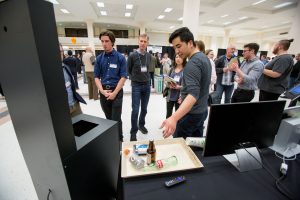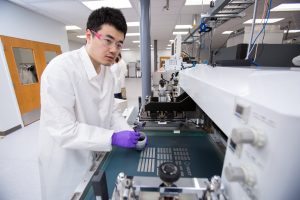Growing Opportunity for Environmental Entrepreneurs

The Alaska Airlines Environmental Innovation Challenge is celebrating its 10th Anniversary on March 29, 2018
Dan Schwartz knows cleantech. “The problem isn’t a lack of ideas,” he said. “The only way environmental innovation will scale and make a difference is through industry involvement.” For four years he has served as director of the University of Washington’s Clean Energy Institute (CEI) and is one of the chief architects of the new Washington Clean Energy Testbeds. The former shares a direct connection with the Alaska Airlines Environmental Innovation Challenge (EIC), hosted by the Foster School’s Buerk Center for Entrepreneurship.
“It is such a natural partnership between the CEI and the EIC. Both connect the broader cleantech community to our campus,” said Schwartz. The pair earned the University a special recognition by the WA Cleantech Alliance, the largest state-based cleantech business organization in the United States. “The fact they recognize and appreciate what we are doing to create the people, the ideas, and our contributions to the ecosystem was really validating and greatly appreciated,” said Schwartz.
The award comes at a time when there is a lot to celebrate. This March, the Buerk Center will host the 10th anniversary of the EIC. Since 2009, the EIC has connected more than 1,100 student entrepreneurs with leaders in the Seattle startup ecosystem and awarded more than $500,000 in prize money and prototype funding. “What is exciting about this year is the passion we see from students to solve environmental problems when the sense of urgency is at an all-time high,” said EIC manager Lauren Brohawn.
At the same time, the University is moving forward with plans for a new innovation district near the Seattle campus that will involve an expansion of the WA Clean Energy Testbeds that opened in February. The Testbeds represent a cutting-edge, experimental platform backed by the state to bring clean energy ideas to market quickly. Its technical advisory council features every cleantech entrepreneur to get an exit in the Seattle-area since 2011. The Testbed concept has caught on in the State of California—prompting organizations there to reach out and partner with UW and the state to create their own version.

UW is moving forward with plans for a new innovation district near the Seattle campus that will involve an expansion of the WA Clean Energy Testbeds that opened in February
“Innovation demands inclusivity,” remarked UW president Ana Mari Cauce at a CleanTech Alliance event. “It is at the heart of progress and we are very committed to building a better world. To do that, we have to cultivate innovation by creating conditions for it to thrive and be rewarded.”
A critical role in that mission will be played by young entrepreneurs. Molly Grear (Civil and Environmental Engineering Ph.D. ’19) and Matthew Murbach (Chemical Engineering Ph.D. ’18), were recently named to Forbes 30 under 30 for their work in clean energy. Murbach competed in the 2016 EIC with his team Battery Informatics and won a $1,000 prize. The co-founder of 2013 EIC grand prize winners PolyDrop was recently named to the Puget Sound Business Journal’s 40 under 40. And the co-founder of the 2017 CEI Clean Energy Award winner at the EIC—and eventual UW Business Plan Competition champion Membrion—was one of the select few invited on a cleantech trade mission to China with Washington Lt. Governor Cyrus Habib.
“It was really cool to see the commitment to cleantech in China and how we are mirroring that on a state level,” said Greg Newbloom (Chemical Engineering Ph.D. ’14). “Washington is positioning itself to help entrepreneurs and help new technologies make it through that transition process.”
The New York Times noted the “West Coast has staked out a place of geeky global dominance” while highlighting the effort by UW to become the regional hub for energy research. That effort includes on-the-ground efforts by UW faculty and students to help in Puerto Rico after Hurricane Maria. Even those who couldn’t help yet have kept their eye on what is happening globally. Bremerton-based SuperCritical Technologies, which earned prizes in the EIC and the UW BPC back in 2012, is working on a compact power plant that can be housed and delivered in a shipping container.
“When you think about the hurricanes in Puerto Rico, Texas, and Florida—people were without power and it was terrible. That shouldn’t happen anywhere in the United States or its territories,” said VP of Business Development Max Effgen (MBA ’11). “The challenge for the 21st century is how do we improve the electricity grid.”
“There are next-level things we can be thinking about,” said Schwartz. “The UW is a research powerhouse. It is a human resource machine for the largest global businesses. We produce people they want, and we have ideas and technologies that are interesting. But if we want to bend the curve for environmental innovation, we need industry paying attention.”
